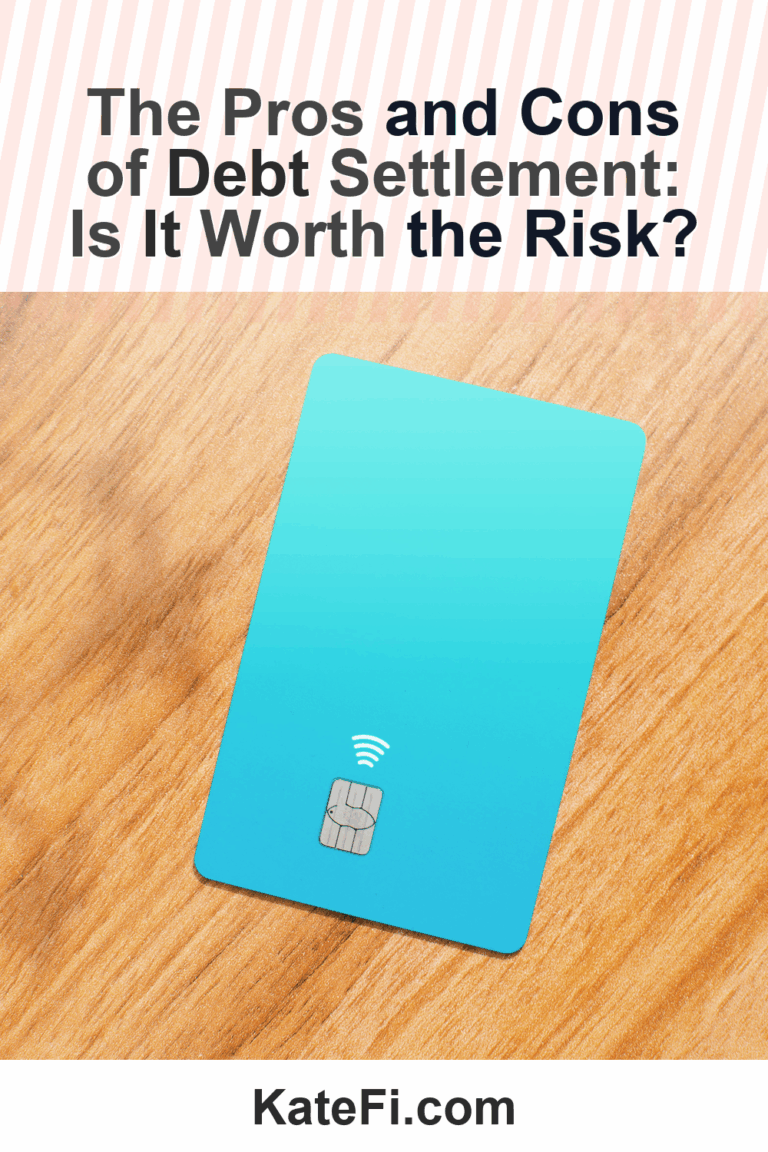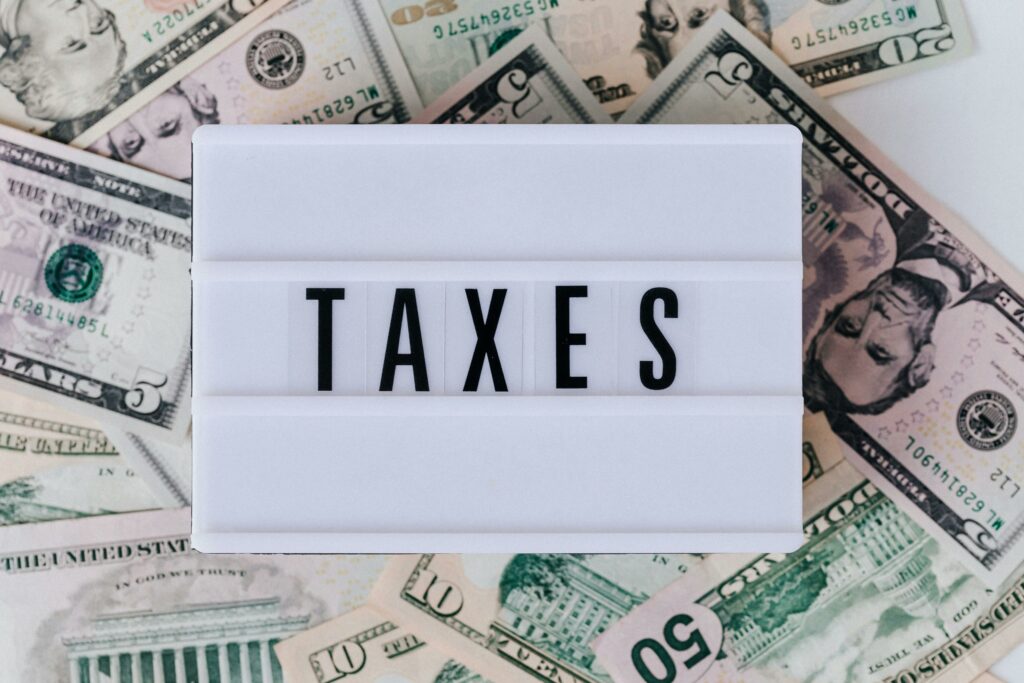The Pros and Cons of Debt Settlement: Is It Worth the Risk?
As inflation rises and household debt continues to climb, many Americans find themselves facing overwhelming financial burdens. The average household debt reached a staggering $15.84 trillion in 2023, with credit cards, student loans, and medical bills accounting for a large portion of this figure. With mounting pressures, many are exploring various avenues for debt relief, including debt settlement. However, navigating this path requires a careful understanding of both its potential benefits and drawbacks.
Love our content? Show your support by following us — pretty please!🥺
FOLLOW ON PINTEREST
Hi! I’m Kate, the face behind KateFi.com—a blog all about making life easier and more affordable.
In this post, we’ll delve into the pros and cons of debt settlement, offer negotiation tactics, and provide guidance on the documentation needed to enhance your chances of success. By the end, you’ll be equipped to make an informed decision on whether debt settlement is the right option for you.
Understanding Debt Settlement
What You’ll Learn on the Call
- Estimated timeline and monthly payment range
- How credit may be affected in the short term
- What documents to gather to move faster
Not available in IL, KS, OR, TN, UT, WV.
Debt settlement involves negotiating with creditors to pay a reduced amount of your total debt. This can often result in significant savings; however, it also comes with its fair share of risks. Before diving deeper, it’s essential to comprehend how debt settlement works.
Typically, individuals or companies specializing in debt relief will assist you in negotiating with creditors on your behalf. They will often propose a lump-sum payment that is less than the full amount owed. If successful, this can relieve some of your financial stress and help you regain control over your finances.
However, it’s crucial to note that not all debts can be settled—secured debts, such as mortgages or auto loans, may require different strategies.
The Pros of Debt Settlement
👉 Start Your Free Debt Relief Review
Not available in IL, KS, OR, TN, UT, WV.
- Reduced Total Debt: One of the most significant advantages of debt settlement is the potential to significantly reduce your total debt. Creditors may agree to settle for less than what you owe, allowing you to pay off debts more easily.
- Quicker Resolution: Compared to other debt relief options like bankruptcy or lengthy repayment plans, debt settlement can be a faster way to achieve financial freedom. Many individuals find that they can resolve their debts in just a few months.
- Less Stress: Managing multiple debts can be stressful and overwhelming. Debt settlement allows you to consolidate your payments into one negotiation, making it easier to manage your finances and focus on rebuilding.
- No New Loans Required: Unlike debt consolidation, where you may need to take out a new loan to pay off old debts, debt settlement does not require additional borrowing.
- Improved Cash Flow: With reduced debt comes more available cash flow. This can help you redirect your finances toward essentials, savings, or investments.
The Cons of Debt Settlement
Lower Your Unsecured Debt
If you have $5,000+ in credit card or personal loan debt, a free consult can review options like settlement or hardship plans.
- One-on-one call to review your debts and goals
- See potential monthly payment reductions
- No obligation to enroll
Not available in IL, KS, OR, TN, UT, WV.
While debt settlement offers several advantages, it is also important to recognize the potential downsides:
- Credit Impact: Debt settlement can have a significant impact on your credit score. Settling a debt for less than what is owed may be reported to credit bureaus, which can lower your credit rating. This can hinder your ability to secure future loans or credit lines.
- Potential for Legal Action: While you are negotiating a settlement, creditors may still pursue collections or even legal action. This risk can increase if you are unable to negotiate an agreement or if payments are missed.
- Fees and Costs: Debt settlement companies often charge fees for their services, which can cut into your savings. It’s essential to carefully review any agreements and understand the total costs involved.
- Tax Implications: Any amount forgiven by creditors could be considered taxable income by the IRS, leading to an unexpected tax liability in the following year.
- Variable Results: The success of debt settlement can vary widely based on individual circumstances, such as the type and amount of debt, your negotiating power, and the willingness of creditors to settle.
Debt Settlement Negotiation Tactics
Understand pros/cons of settlement vs consolidation vs DMP for your exact mix of debts.
Not available in IL, KS, OR, TN, UT, WV.
If you decide that debt settlement is the right choice for you, effective negotiation tactics are essential to achieve the best possible outcome. Here are a few strategies to consider:
- Document Your Hardship: When negotiating with creditors, having a clear documentation of your financial hardship can strengthen your case. Gather pay stubs, bank statements, and any medical bills that illustrate your situation. This evidence will support your request for a reduced settlement amount.
- Start Low: When negotiating a settlement, start with a lower offer than what you are willing to pay. This gives you room to negotiate upwards while still aiming for a favorable outcome.
- Stay Calm and Professional: Emotions can run high when dealing with debt, but it’s essential to remain calm and professional during negotiations. Maintain a polite demeanor, even if the conversation becomes challenging.
- Know When to Walk Away: Be prepared to walk away if the creditor is unwilling to negotiate fairly. Sometimes, expressing your willingness to consider other options can prompt creditors to make more favorable offers.
- Follow Up in Writing: After reaching an agreement, follow up with a written confirmation of the terms discussed. This protects you in case any discrepancies arise later.
✅ See If You Qualify for Debt Relief
What Documents to Gather for Faster Review
To streamline the debt settlement process, gathering the necessary documentation ahead of time can expedite your review. Here’s a practical checklist:
- Income Statements: Pay stubs or bank statements to demonstrate your current income level.
- Monthly Expenses: A breakdown of your monthly expenses, including housing, utilities, groceries, and other necessary payments.
- Debt Information: List of all debts, including creditors’ names, balances, and account numbers.
- Hardship Letters: Written statements explaining your financial hardships that have led you to seek debt settlement.
Having these documents ready not only speeds up the process but can also enhance your negotiating position.
Weighing Your Options: Is Debt Settlement Right for You?
The decision to pursue debt settlement requires careful consideration of your financial situation, goals, and comfort level with the potential risks involved. While the opportunity to significantly reduce your debt may seem appealing, the associated consequences—particularly regarding credit impact and legal risks—should not be taken lightly.
Before making a decision, it may be beneficial to explore all available options. A free consultation can provide clarity on whether debt settlement is the right choice for your unique circumstances.
✅ See If You Qualify for Debt Relief
Final Thoughts
As we navigate the complexities of managing household debt, understanding the pros and cons of debt settlement can provide valuable insights for those seeking relief. By using effective negotiation tactics and being prepared with the necessary documentation, you can increase your chances of successfully settling your debts. However, always weigh the potential risks and impacts on your credit score before moving forward.
For tailored advice and a comprehensive review of your options, consider reaching out for a free consultation.
✅ See If You Qualify for Debt Relief
Important: This content is for education only—not legal, tax, or financial advice. Results and eligible programs vary by situation and state. Fees apply if you enroll and complete a program. Debt relief can affect credit; missed payments may lead to collections/lawsuits. Not available in IL, KS, OR, TN, UT, WV.
By exploring all your options and arming yourself with the right information, you can take meaningful steps toward regaining control of your financial future. Whether through debt settlement or another avenue, there’s a path to relief that suits your unique needs.






















